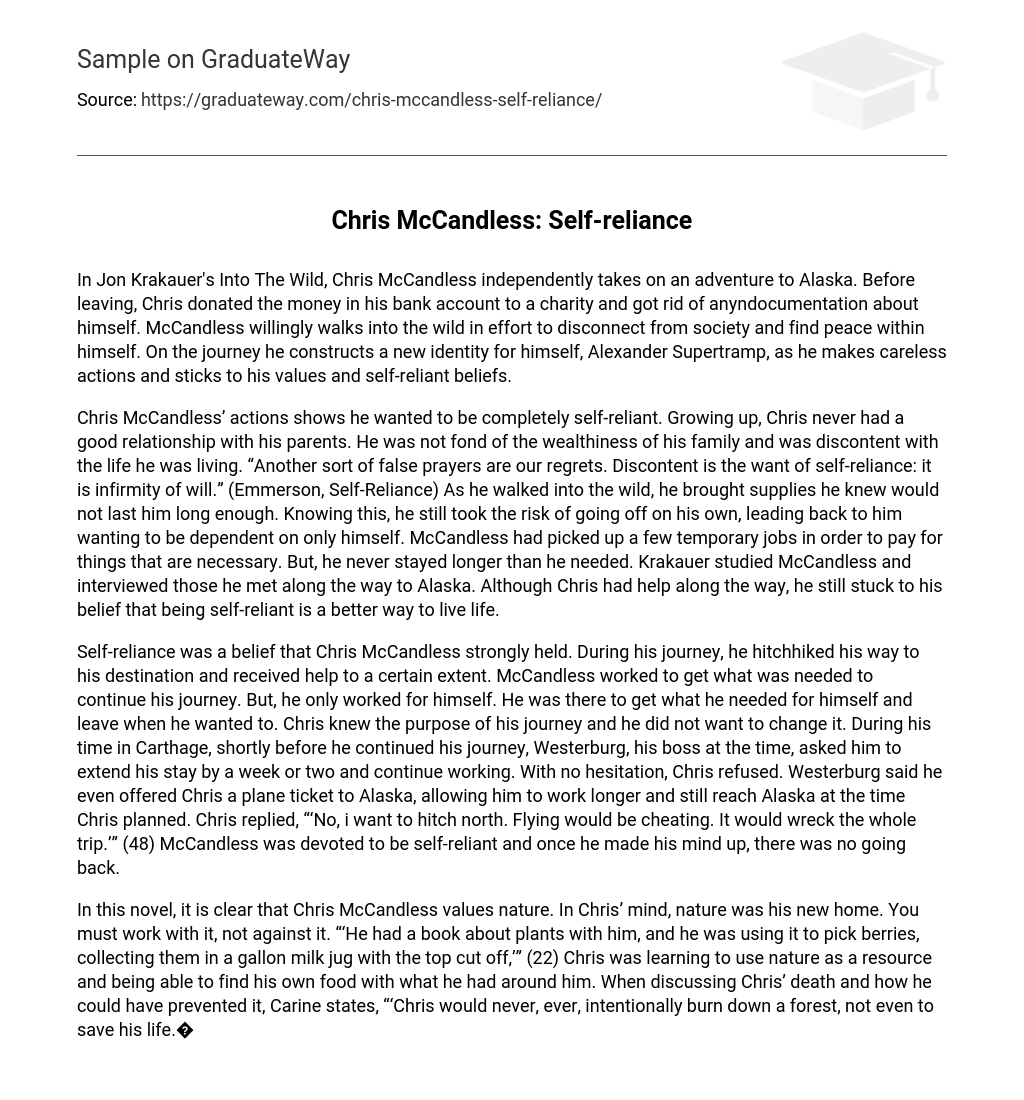In Jon Krakauer’s Into The Wild, Chris McCandless independently takes on an adventure to Alaska. Before leaving, Chris donated the money in his bank account to a charity and got rid of anyndocumentation about himself. McCandless willingly walks into the wild in effort to disconnect from society and find peace within himself. On the journey he constructs a new identity for himself, Alexander Supertramp, as he makes careless actions and sticks to his values and self-reliant beliefs.
Chris McCandless’ actions shows he wanted to be completely self-reliant. Growing up, Chris never had a good relationship with his parents. He was not fond of the wealthiness of his family and was discontent with the life he was living. “Another sort of false prayers are our regrets. Discontent is the want of self-reliance: it is infirmity of will.” (Emmerson, Self-Reliance) As he walked into the wild, he brought supplies he knew would not last him long enough. Knowing this, he still took the risk of going off on his own, leading back to him wanting to be dependent on only himself. McCandless had picked up a few temporary jobs in order to pay for things that are necessary. But, he never stayed longer than he needed. Krakauer studied McCandless and interviewed those he met along the way to Alaska. Although Chris had help along the way, he still stuck to his belief that being self-reliant is a better way to live life.
Self-reliance was a belief that Chris McCandless strongly held. During his journey, he hitchhiked his way to his destination and received help to a certain extent. McCandless worked to get what was needed to continue his journey. But, he only worked for himself. He was there to get what he needed for himself and leave when he wanted to. Chris knew the purpose of his journey and he did not want to change it. During his time in Carthage, shortly before he continued his journey, Westerburg, his boss at the time, asked him to extend his stay by a week or two and continue working. With no hesitation, Chris refused. Westerburg said he even offered Chris a plane ticket to Alaska, allowing him to work longer and still reach Alaska at the time Chris planned. Chris replied, “‘No, i want to hitch north. Flying would be cheating. It would wreck the whole trip.’” (48) McCandless was devoted to be self-reliant and once he made his mind up, there was no going back.
In this novel, it is clear that Chris McCandless values nature. In Chris’ mind, nature was his new home. You must work with it, not against it. “‘He had a book about plants with him, and he was using it to pick berries, collecting them in a gallon milk jug with the top cut off,’” (22) Chris was learning to use nature as a resource and being able to find his own food with what he had around him. When discussing Chris’ death and how he could have prevented it, Carine states, “‘Chris would never, ever, intentionally burn down a forest, not even to save his life.”’ (135) This shows that even though nature let Chris down and had potentially taken his life, Chris would not harm it. Chris would not take the life of something beautiful and peaceful in order to save his. His value for nature was stronger than the value of his life.
Chris McCandless was a young man who ventured off into the wild when he was twenty four years old. He did not want to be a part of society and be around any kind of civilization. Therefore, he walked into the wild with no warning to his family and introduced himself as Alexander Supertramp. In his mind, he was no longer Chris McCandless and he began to construct a new identity based off his careless actions and sticking to his value of nature and self-reliant beliefs.





